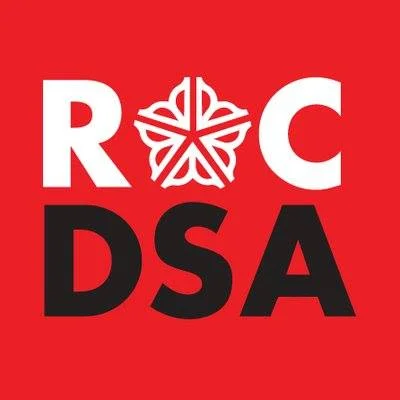
Rochester Red Star | February 2026 | (Issue 22)
Monthly Newsletter of the Rochester Chapter of Democratic Socialists of America
Welcome to the February issue of Rochester Red Star. In this issue, read remarks on ICE violence, protest, and our chapter’s recent 2025 Convention. You’ll also find details on upcoming events, and coverage of chapter activities over the past month.
Interested in contributing? Send submissions to bit.ly/SubmitRedStar, or get involved with our Communications Committee. Reach out to steering@rocdsa.org and join DSA today!
The post Rochester Red Star | February 2026 | (Issue 22) first appeared on Rochester Red Star.
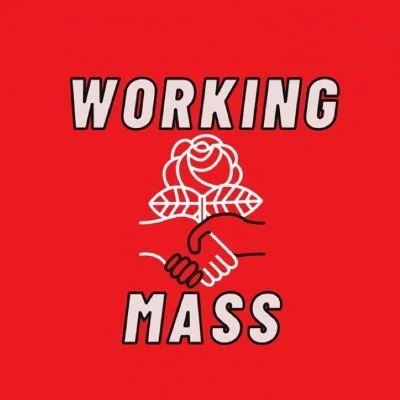
Shipyard Unionism: A Novel of Triumphs and Defeats – A Review of Goliath at Sunset by Jonathan Brandow

By: Kurt Stand
This was originally published by Portside on December 18, 2025.
“Here’s what’s wrong in this yard. Two white welders get fired and blackmailed into silence for their jobs. A third one, black, with an unblemished record, is fired for the same supposed offense and the company refuses to budge.”
“Ain’t right!” someone called.
“But not one of the three welders should have lost a minute of pay, much less their jobs. And why? Because you can’t breathe carbon monoxide! They are all victims of this company’s core value: Production over safety!”
Set at a shipyard in Quincy, Massachusetts where Brandow worked for 9 years, he uses his experiences as a welder and a union officer to give Goliath an authenticity that is too often lacking in fictional depictions of labor. This is evident in his awareness of the complexity of the characters in the novel, in the picture he presents of union meetings, grievance handling, rank-and-file organizing.
Set in the late 70s — early 80s. at the time of the Iran hostage crisis and the racist violence that followed attempts to desegregate Boston’s public school, Brandow places his work in a wider context of events shaping the time without ever losing his focus on the shipyard. The novel centers on the life of Michael Shea, a Vietnam vet whose personal experiences lead to awareness of class injustice (fueled in part by his mother’s picket line assault that results in her death), and, unusual in the community in which he was raised, awareness of racial injustice and a rejection of the racial hatreds that surround him. Shea’s status as a veteran at a time when jobs were plentiful, enables him to find work as a welder. The hazards of shipyard work, the union’s unwillingness to fight back, lead him to become an engaged unionist and eventually, a shop steward. This is shown against the backdrop of personal challenges and difficulties that make this path anything but a linear march of progress.
At the center of the novel is a conflict over the role of shop stewards. Do they serve the union leadership, doling out favors to the skilled, the “loyal,” those who are white; do they defend workers by compromising their rights; or do they fight management through unity, creativity, militancy, by organizing rank and file participation – and reaching out for support outside the workplace.
Behind those choices lies a difference as to how to relate to a changing workforce. A shipyard that in living memory had been almost all white men now includes Black Americans, West Indians, Cape Verdeans, Puerto Ricans, a small but growing number of women, all of whom the old leadership fears and resents. And many of the younger white workers don’t have the commitment to the job or union that older ones had. Thus a weakened union, a union that has become parochial, a union that still tries to represent the workforce but does so through compromises with management that allows for small victories at the expense of loss of rights. The price of doing so is at a cost that will come due.
The battle over the quality of the work stewards perform is merged with the battle to have enough stewards. That conflict is central to all that follows as Brandow makes clear early on.
[Shea] checked his contract … it permitted one steward for each two hundred hardhats in a department. Despite that, the union by-laws capped the number at a single steward [per department]. He couldn’t let that go. How could it be possible that the union – not the company – limited the number of stewards, the front-line protections guys had on the job? Shea realized it really was a black and white issue. The only truly affected department, the only one that qualified under the contract for additional stewards, was welding—the only department with a significant number of black votes.
That sparks a union meeting where the rank-and-file gets defeated by leadership afraid that opening doors might loosen their own authority. Subsequent battles – over racist graffiti in bathrooms, the lay-off of a pregnant worker, speed-up, safety & health concerns, company disciplinary policies, the conduct of a strike – show the shifting sentiment of workers, how prejudiced attitudes can be broken down and how they can resurface. In all of this, the fights and arguments that take place within the union are always presented in the context of the real problem, management policy that devalues the life of all workers.
Brandow’s description of how a rank-and-file movement organizes demonstrates that understanding, its goal is to strengthen the union as a whole, not to attack or undermine it. Here too, his writing reflects what he lived, the meetings, arguments, tensions, celebrations, camaraderie, disappointments, harsh language flung back and forth even between friends, all contain the ring of truth.
Those complications are also those of the characters who people the novel, all with lives outside the job, all facing the pressures of working-class life in which opportunities are few and (even in a more “stable” era) precarious. The violence in the air post-Vietnam, when reaction was raising its ugly head trying to push down progress toward social justice, the uncertainties as those changes were reflected in personal relationships, are very much part of novel’s depiction of workplace life. The multi-racial character of the shipyard and of Boston and its environs as much a part of the story as the reaction to it, just as is the assertiveness of women pushing back against silences that had prevailed.
That reflects itself in the character of the “sell-out” union president, who remembers with nostalgia, the militancy, the willingness to fight, that built the union. He respects the new militancy of Shea and the others pushing for change, as much as he does all in his power to undermine them. He rationalizes the compromises with management he makes every day, for all he sees is a losing battle. His weakness is part of the problem, no doubt, but nonetheless, he is right – management holds the cards. For those who lived through those times, reading Goliath is a reminder of what happened when layoffs swept industry, fear of job loss leading those who had resisted to accept the unacceptable as safety regulations went out the window. The end result is a feeling Brandow well describes as he records Shea’s thoughts toward the end of the novel as the combination of permanent layoffs, unrelenting speed-up, breakdown of shifts and jobs assignments, leave workers demoralized, the old union leadership out in the cold, younger union activists with a sense of defeat.
He knew they thought of their homes, fishing trips in New Hampshire, mythic fiberglass boats skimming over the water, the week, maybe two in a year that they prized as their own. They thought of their own little girls and their sons in their yards. All gone. They knew they would go to their graves with a rage they could never concede. They stood by the basin and yearned for a bright, free beginning. For a start they knew they would never be given.
That describes a reality that those newer to labor activism also need to know for no gain should ever be taken for granted, unity needs to be fought for again and again, struggles for justice at the workplace need to be joined to those taking place in the communities where people live and the broader forces pushing society in one direction or another have to be engaged. Perhaps the greatest strength of the novel lies in making clear that what matters is not just the outcome of a particular battle – for win or lose, it is transitory. Rather what matters is what we take away from each dispute, each organizing effort, how to integrate that in one’s own life. Shea reflects that challenge in himself, his personal weaknesses as much a part of the story as his strengths. The novel’s conclusion providing a good starting point for thinking about how to accept loss, which way to look for new beginnings, a search that – almost by definition, is never easy.
Cotty and Lonny [two of the rank-and-file leaders] watched them go. They looked around, searching for Shea before they went in. He was the last to join the line. Cotty said, “You did what you could.” Shea nodded without hearing. “For real, man,” Lonny added, poking Shea in the chest. “I mean, we had men and women, black and white, every shift pulling together. That’s real. That’s something they can’t take from us.”
“Yeah, maybe,” he said as he followed them into the ship and headed for his worksite. Shea’s legs ached to skip down the stairs, to churn past the gates, to breathe in the freedom outside. Instead, he stumbled his way past slaggy mounds of main deck debris toward his gear. The last whistle blew.
Goliath at Sunset was published by Hard Ball Press on December 15, 2025.
Kurt Stand was active in the labor movement for over 20 years including as the elected North American Regional Secretary of the International Union of Food and Allied Workers until 1997. He is a member of the Prince George’s County Branch of Metro DC DSA, and periodically writes for the Washington Socialist, Socialist Forum, and other left publications. He serves as a Portside Labor Moderator, and is active within the reentry community of formerly incarcerated people. Kurt Stand lives in Greenbelt, MD.
The post Shipyard Unionism: A Novel of Triumphs and Defeats – A Review of Goliath at Sunset by Jonathan Brandow appeared first on Working Mass.
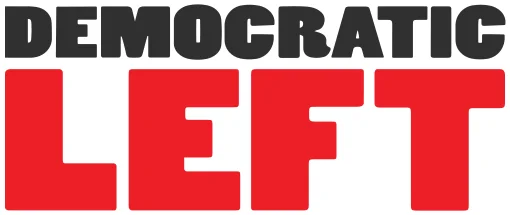

Response Letter from the Italian Internationalists
A response to our article on Lotta Communista in Italy.
The post Response Letter from the Italian Internationalists appeared first on Democratic Left.
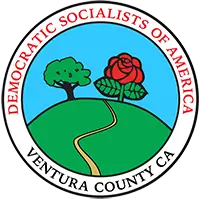

Steering Committee Meeting
Date: Thursday, February 12, 2026 at 6pm PST
Online Only. RSVP for Zoom Link.
Monthly Steering Committee Meetings are open to members to observe but, generally, only Steering Committee members may vote and participate.


Electoral Working Group
Wednesday, February 11 at 6 pm PST (Online)
We begin Phase III for Voter Guide, review timelines and Chapter Endorsement Guidelines.


DSA 101
Wednesday, February 4 · 6:00 – 7:00pm (Online)
Tired of waiting for Democrats to do something about Trump and MAGA fascism? Wondering if there is a different answer for issues we face today? Come learn about democratic socialism, our theory of political change, and how you can join our fight against the oligarchs destroying our country.


Political Education Working Group
Monthly Working Session Meeting
The Political Education Working Group is the place to bring your ideas for workshops, educational material, agitprop, and more. Our goal is to bring socialist ideas, DSA messaging and campaigns, and class consciousness to the people of Ventura County. All levels of organizing experience welcome.


Coffee with Comrades
Date: Sunday, February 1, 2026 from 9:30 am til 11:30 am
Location: Ragamuffin Coffee Roasters• 550 Collection Blvd, Oxnard, CA 93036
Come join like-minded comrades for a cup of your favorite morning beverage. These gatherings offer a relaxed space to meet members and find out how to get involved, decompress, talk about the issues we face, and stay connected as we close out the year.
No RSVP needed!
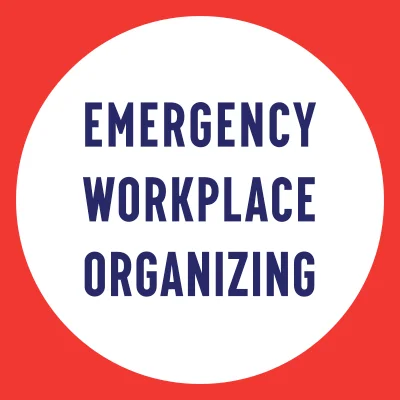

The myth of “Unions can’t change anything”
What can a stoplight in Syracuse teach us about collective action at work?
The post The myth of “Unions can’t change anything” appeared first on EWOC.


Frigid But Not Frozen
Scenes of repression and resistance in Minneapolis.
The post Frigid But Not Frozen appeared first on Democratic Left.